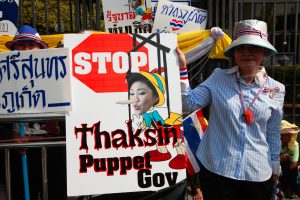Yesterday evening, Thailand’s former Prime Minister Thaksin Shinawatra took to Twitter to announce – once again – that he intends to return home in July, after 17 years in self-imposed exile. The announcement comes just days ahead of a national election in which the Pheu Thai Party, led by his daughter Paetongtarn Shinawatra, is expected to prevail, and injects a volatile new element into the country’s already febrile political climate.
The divisive former leader was ousted in a military coup in 2006 and left Thailand for good in 2008 to avoid facing time in prison on corruption charges that he claims were politically confected. Since then, he has made numerous promises to return without them ever eventuating, but as Reuters notes, his remarks on Twitter were the first time in recent years that he has set a timeframe.
“I am seeking permission again. I have decided to come home to see my grandchildren within July, before my birthday,” he said. (His birthday is July 26.) “It has been 17 years since I have been separated from my family. I am old.” Thaksin did not say from whom he had requested permission.
This is not the first time that Thaksin has announced his intention to return to Thailand after the election. Back in March, he told Japan’s Kyodo News that he hoped to come home and that he was willing to serve his prison sentence in order to do so. He added that he would not apply for an amnesty from parliament even if Pheu Thai forms the next government.
Thaksin has long been the ghost at the Thai political banquet, his frequent promises of a return simultaneously exciting his supporters and inciting the fears of the conservatives that drove him from the country.
As such, even if Thaksin does not return – indeed, most observers think it unlikely – the timing of yesterday’s announcement is politically risky and potentially destabilizing. Pheu Thai enjoys a healthy lead in most pre-election polls and is likely to win the largest share of seats in parliament, setting up another showdown with Thailand’s conservative establishment, which has worked hard to efface Thaksin’s influence from the political landscape since the 2006 coup.
This has involved direct military interventions – the army launched a second coup against a government led by his sister, Yingluck Shinawatra, in 2014 – and a number of politically-tinged court rulings. Indeed, the Constitution drafted and promulgated by the military government in 2017 created an unelected 250-member Senate that will vote to elect the next prime minister, precisely to create a seawall against a possible Thaksin-led electoral tsunami. As a result, unless Pheu Thai can win an unlikely supermajority in parliament, it will face considerable difficulties in having one of its chosen nominees elected prime minister.
To be sure, there has been much recent talk of a possible “national unity” coalition between Pheu Thai and the ruling Palang Pracharath Party, something that the former has recently been keen to play down, given its supporters’ antipathy to the military. It is always possible that after two decades of butting heads with the Thai establishment, Thaksin could make a pragmatic decision to join such a coalition in the interests of political stability. But as Susannah Patton of Sydney’s Lowy Institute noted in an article this week, Thaksin has a history of taking immoderate risks in a bid to sweep the political field, such as when Pheu Thai nominated a member of the royal family as its prime ministerial candidate ahead of the 2019 election. (The princess was promptly blocked from running by the courts.)
At the same time, the situation is precariously poised. Pheu Thai will have to go to great lengths to assure a conservative establishment that has long been haunted by the prospect of Thaksin’s barnstorming return from self-exile. Rumors are already swirling that the conservative establishment could resort to extra-democratic methods to dissolve Pheu Thai or the more radical Move Forward Party (MFP). In Pheu Thai’s case, sources told the Thai Enquirer, the case for dissolution would likely involve the undue influence of Thaksin – a convict and fugitive – over the party’s organization and finances. The risk grows all the greater should Pheu Thai score a significant electoral victory or ponder a coalition with the MFP.
It is hard not to see Thaksin’s announcement, made so close to election day, as a conscious political move designed to energize his supporters to get out and vote. Otherwise, why not wait until after the polls close? But at this juncture, a rumored return by Thaksin will only give conservatives an excuse to resort – once again – to undemocratic methods to banish his ghost from the party.
































